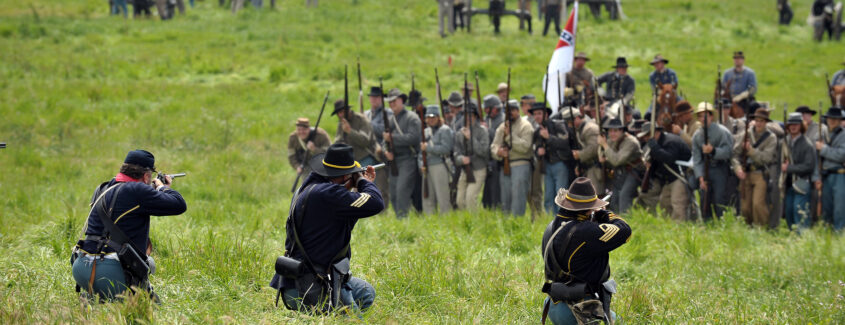
Nikki Haley recently provoked a firestorm of controversy for failing to name slavery when asked by journalists what caused the Civil War. A chorus of critics, including President Joe Biden, censured her response. Biden declared, “Let me be clear for those who don’t seem to know: Slavery was the cause of the Civil War.”
Haley’s omission of slavery as a cause of the war was glaring; she later claimed she did not mention slavery because it was “a given.” The causes of the war, however, are much more complex than Biden and many other of Haley’s critics maintain. Historians have long argued that political, psychological, economic, social, political, moral, and religious factors all contributed to the outbreak of war. Fear, confusion, misunderstanding, and genuine differences raised tensions between Northerners and Southerners.
The issue of states’ rights versus nationalism was a major point of contention. Northerners and Southerners disagreed about which was older or primary: the Union or the states. They debated whether the Constitution created a truly national government that had substantial powers or a voluntary federation of sovereign states. Since the nation’s founding, almost every state had at some time proclaimed its own sovereignty while denouncing similar declarations by other states. These assertions included the Virginia and Kentucky Resolutions of 1798-1799, the Hartford Convention of 1814, South Carolina’s nullification of an 1832 tariff, the arguments of several states that the federal government had exceeded its authority in annexing Texas, and protests over the Fugitive Slave Law of 1850. In short, those who held political power at the federal level tended to be strong nationalists, whereas those who did not tended to be advocates of states’ rights.
Historians also point to the regions’ differing economies as a cause of the conflict. The largely agrarian South produced cotton, tobacco, and other agricultural products, whereas the North focused more on commerce and industry. As a result, many Southerners opposed Homestead laws, tariffs, and internal improvements that would more strongly connect the North and western part of the nation.
The clash of cultures is a third factor. The more agrarian, paternalistic, and conservative South was largely controlled by a plantation gentry. The North, by contrast, was more urban and liberal and had a larger middle class. The South’s population was more Anglo-Saxon; its religion was more dogmatic and emotional; its romantic and hedonistic impulses were stronger; its class stratification was more rigid; and its intellectual community was less substantial than the North’s. Many Northerners argued that the anachronistic, backward, semi-civilized South, which was out of harmony with the highest ideals of the mid-19th century, must give way before the manifest destiny of the industrialized, centralized nation the North embodied. Southerners countered that the North was a hotbed of radical ideologies and Puritan hypocrisy.
Other historians emphasize the role of blundering politicians, especially ineffectual presidents, and such irresponsible agitators as John Brown in bringing on the war. Had the United States had better political leaders and fewer misguided, dissenters, they claim, the war might have been prevented.
Meanwhile, the press fueled the animosity between and grievances of residents of the two regions as it reported on developments ranging from Bleeding Kansas (the violent clashes in this border state between 1854 and 1859) to John Brown’s 1859 raid at Harper’s Ferry to free slaves. The proliferation of newspapers, railroads, and telegraph lines in the 1840s and 1850s enabled editors, who often quoted the most inflammatory statements of Northern and Southern politicians out of context, to accentuate the alleged dangers these politicians posed and amplify their threat.
Slavery clearly did play a major role in causing the war. Arguments about the morality and economic impact of “the peculiar institution” intensified and inflamed all the other factors that contributed to the conflict. The moral debate over slavery prompted Presbyterians, Methodists, and Baptists to divide into separate communions, severing religious connections that had helped bind the nation together. Without the divisive issue of slavery, the country would likely not have been torn apart by war.
Further complicating the debate over what caused the Civil War are two considerations. First, counterarguments can be posed to most of the causal factors listed above. For example, the United States was more homogeneous in 1860 than it had been in 1760 or would be in 1960. The nation was largely WASP and agrarian and its people held many similar political, economic, cultural, and religious values.
Second, there are at least three different ways to ask what caused the Civil War. One is: What caused the North and South to engage in unremitting controversy for more than a generation? A second is to inquire: What caused the states of the deep South to secede after Abraham Lincoln’s election in 1860? The answer to this question includes Republican economic demands, the end of sectional balance with the admission of several “free” states to the Union, a belief in the right of secession, the conviction the North would not and could not prevent it, the fear that Lincoln was an extremist, not moderate, and South Carolina’s quick and decisive action. Finally, what caused most Northerners to prefer war over recognizing Southern independence and to be willing to fight to sustain the Union?
Strikingly, despite decades of research that have increased our factual knowledge about the Civil War, historians are no closer to agreeing about what caused it than their counterparts were in earlier decades. This highlights the point that the determination of historical truth often relies as much or more on the basic philosophical assumptions people apply when interpreting the data than upon the data itself.
In short, more than 160 years after its outbreak, we must acknowledge that the causes of the Civil War are complicated and eschew simplistic explanations.

